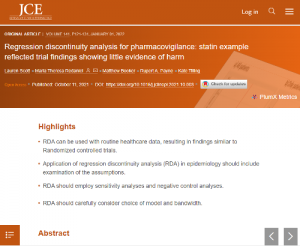Study shows regression discontinuity analysis can be used on routine healthcare data
24 November 2021
A newly published study has shown that a statistical method called regression discontinuity analysis (RDA) can be used on routine healthcare data. The research, published in the Journal of Clinical Epidemiology, demonstrated that RDA produced similar results to randomised control trials.
RDA allows statisticians to compare two groups above and below a threshold. The researchers used RDA to examine national data to provide stronger evidence on statins. They analysed data from the UK Clinical Practice Research Datalink. The UK Clinical Practice Datalink contains anonymised patient data from a network of GP practices across the UK.
QRISK is an algorithm used for predicting cardiovascular risk and is used to help doctors decide when to prescribe statins. There is a QRISK threshold of 20, above which statins are often prescribed.
They did an RDA analysis of patients above and below the QRISK threshold, looking at patients with QRISK scores of 10-30 in 2010-2013 who were last followed-up in October 2016. They compared patients with QRISK above and below 20 and looked at total cholesterol in these patients. They also investigated the possible side effects of statins.
Statins are some of the most widely prescribed drugs in the UK but there are many reported side effects. The best type of study to examine the effects of medicines is a randomised controlled trial (RCTs). In an RCT, patients take either a medicine or a placebo (a dummy drug having no effect). They don’t know which one they are taking. New RCTs can be expensive and time consuming. Also, they might not always be the most appropriate method to answer the research question.
For such cases, there are other designs, such as observational studies. In observational studies, researchers observe a sample population, but they don’t try to influence who’s exposed to a risk factor or intervention. This might be by looking at an existing dataset. Advanced statistical methods can then be used to counteract the limitations of an observational study.
The analysis confirmed the findings of RCTs, that taking statins reduced total cholesterol. They found little evidence that statins led to:
- diabetes
- muscle pain and weakness
- liver disease
- cardiovascular disease
- death
Dr Theresa Redaniel, Senior Lecturer in Health Services Research and Epidemiology at NIHR ARC West and the University of Bristol, said:
“Regression discontinuity analysis is a statistical method that isn’t used very often. Our findings are similar to the results from more expensive and time-consuming randomised control trials, demonstrating that RDA can be used with large routine clinical datasets. It can provide evidence on medications prescribed according to a threshold. This method could be applied to answer other research questions where an RCT isn’t appropriate.”
Paper
